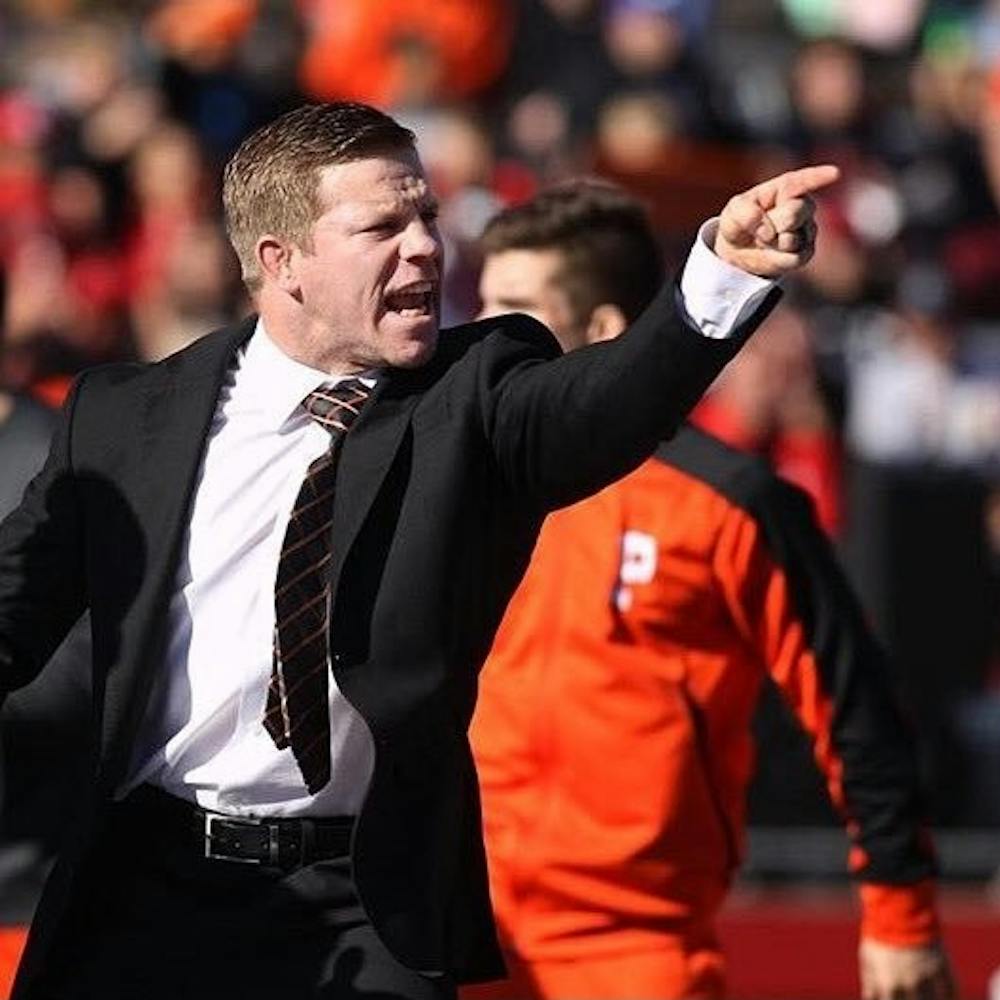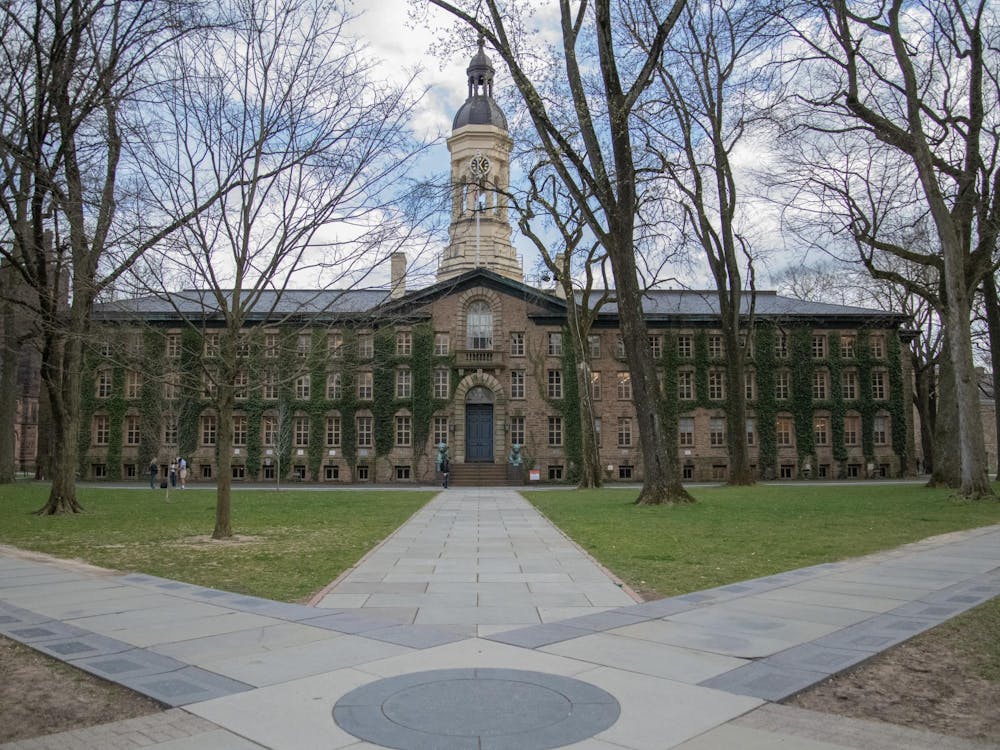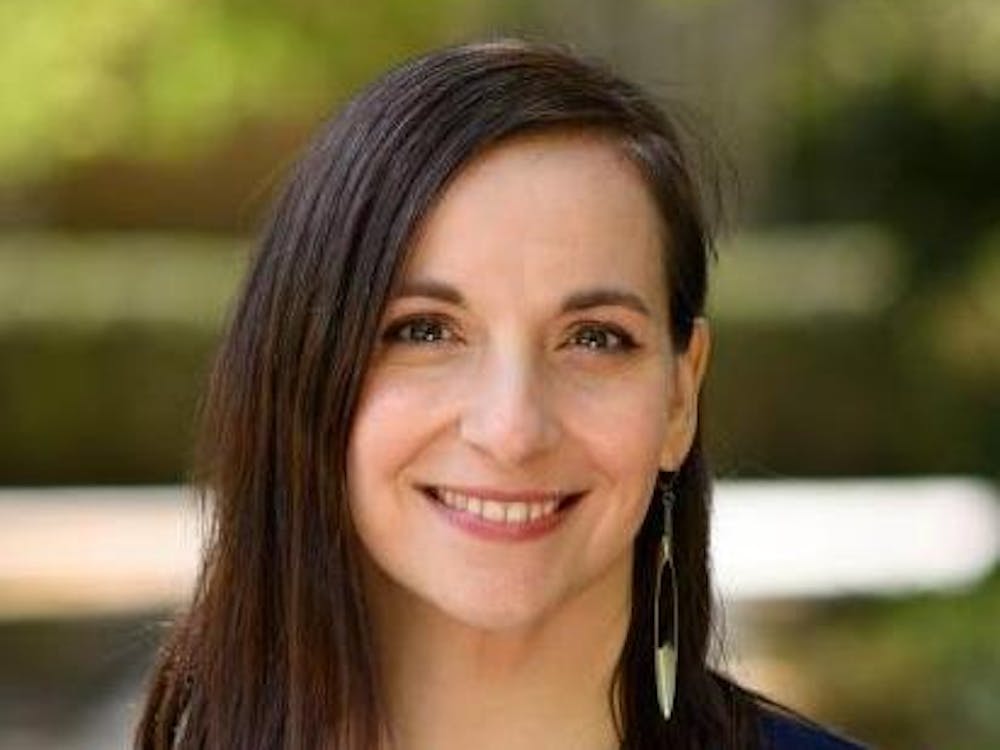On the wrestling mat, Joe Dubuque is still only for a second. He lunges, he bounces, he spins. He folds himself in two. He drops to his hands and knees, springs back up. He flinches at each move Princeton’s opponent makes. But Dubuque isn’t Princeton’s wrestler; he puts on his nonstop, kinetic show from the coaches’ corner.
“I can’t help it,” he said. “I’m a maniac.”
A native of Bloomfield, New Jersey, associate head wrestling coach Dubuque grew up an athlete. He played baseball and football from the earliest moment he could. But Dubuque — who sits decidedly closer to five feet than to six — found himself dwarfed on the diamond and the field. He was good, nothing more.
Close to home, he found something he was great at. Five years his elder, Dubuque’s brother was a high school wrestler. As the sport favours those closer to the ground, he thought it might be a good fit for his kid brother. He started dragging him to practices, to clubs, to tournaments. Dubuque was hooked.
He put on a singlet for the first time when he was 12. At 13, he placed at New Jersey’s junior state tournament. He ended his high school career a two-time New Jersey state champion and a national title-holder. He fielded recruiting offers from powerhouse programs like Rutgers and UNC. And Princeton?
“Are you kidding?” He laughed. “I could never go to school here.”
In the end, 125-pounder Dubuque committed to wrestle at Indiana University. It seemed a strange choice for such a highly touted recruit. He’d be 750 miles from home and locked into four years with a floundering program; his senior year of high school, the Hoosiers had finished their season No. 57 in the country.
But Dubuque had his sights set on a national title. There was no better place to hunt for one than the Big Ten Conference. And the Hoosiers’ struggle wasn’t a drawback to him. If anything, it was a boon.
“I want to be somewhere where I can have the biggest impact possible,” he said. “What I’m drawn to is building.”
For the next four years, Dubuque did exactly that.
At the first tournament of his redshirt freshman season, he beat an All-American ranked sixth in the country. It was downhill from there. In his own words, he was “uncourageous, undisciplined, uncoachable.” He partook too often in what he called, with a smirk, “extracurricular activities.”
His regular freshman season ended early because of a concussion. At the Big Ten championship, he served as the team water-boy and watched with bitter regret as his rivals medalled. He sat down with his coaches after the tournament and promised to get tougher.

“Whatever you want, I’ll do,” he said. “I’m all in.”
His sophomore season, a newly courageous, disciplined, coachable — and strictly curricular — Dubuque entered the NCAA tournament seeded eighth. He was a nervous wreck. Once his first opponent pinned him —for the only pin of Dubuque’s collegiate career — Dubuque was out of the running for a title. To earn All-American status, he’d have to win five straight matches.
In his first consolation match, Dubuque tore his ACL; he could feel his knee moving around with every step. But the team trainer looked him in the eye and told the onlookers it was just a strain. Dubuque got the message: all in.
He won five straight matches. Then he kept going.
His junior year, Dubuque took home Indiana’s first individual NCAA title since 1990 and led the team to a No. 9 finish. In four years with Dubuque at the helm, the Hoosiers had jumped 48 spots in the national rankings. The next season saw Dubuque become Indiana’s second ever two-time national champion and its first back-to-back national champion.
Dubuque had entered college with dreams of becoming a businessman. But as graduation loomed, he realized he hadn’t grown out of that twelve-year-old’s wrestling addiction just yet. He took on a coaching job at Hofstra University.
In 2007, at the urging of his girlfriend — now wife — Jaimie, he made an Olympic run. Two herniated discs in his neck and a baby on the way cut his training short. He spent two more years coaching at Hofstra, and two more at Indiana.
Then, in 2012, he got a call from a number with a familiar area code. Head wrestling coach Christopher Ayres was six years into heading Princeton’s wrestling program, and the Tigers were floundering. They’d finished 1—4 in the Ivy League, No. 11 at the EIWA championships. They hadn’t produced an NCAA champion in 59 years. But they were on the come-up. Ayres knew how Dubuque felt about building. Here, he promised, would be an opportunity to do so.
Dubuque was sold.
“I’ve always been overlooked,” he said. “I like that role. I like being the guy with the chip on his shoulder. It’s what I do best.”
Dubuque’s six years with the program have seen its historic turnaround. In March, for only the third time in school history, Princeton pulled off a top-15 finish at the NCAA Championship. It left the tournament with a program-high two semifinalists and three All-Americans.
One of those All-Americans was 125-pound first-year Patrick Glory. A two-time New Jersey state champion, he grew up 40 minutes from Dubuque. His little brother wrestles against Dubuque’s son, Chase, who wins “every time.” Both men come from Italian families, and value their Sunday dinners. The two are training partners in the wrestling room and friends outside of it. To Dubuque, Glory seems a younger, more coachable, more focused version of himself.
Glory agrees with that assessment on most fronts.
“He’s been in my shoes,“ he said. “He can relate to what I go through. Just maybe not academically. I mean, I’m sure he had to do some work in college.”
Dubuque was all in on winning a title for Indiana, even when that meant wrestling a tournament on a torn ACL. He was all in on turning Princeton’s wrestling program around, even if it meant uprooting his family for a long-distance move. And he’s all in on all of his athletes.
“If you show the athlete that you’re willing to do anything and everything for him,” he said, “he’ll be willing to do anything and everything for you. I’m all in, always. Not just for Pat: for everyone.”
Off the mat, Dubuque drives his athletes to MRI appointments, gets their laundry, cuts weight with them if they’re in need of company. On it, his passion turns into raw energy. He spins, jumps, pumps his fists. He screams and barks: sometimes, Ayres physically restrains him.
“In the matches,” said Glory, “the only people I hear are the coaches and the ref. Especially Dubuque.”
“Yeah,“ said Dubuque. “I’m fricken passionate. I wear my emotions on my sleeve. I’m all in. I’m a maniac. Have I said that yet?”









